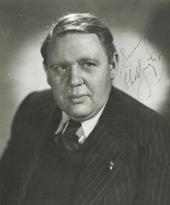Born July 1, 1899 in Scarborough, Yorkshire, England the son of Robert Laughton and Elizabeth Conlon.
Educated at Stonyhurst, Royal Academy of Dramatic Art (received gold medal).
First appearance on stage, 1926.
Formed his own film company, Mayflower Pictures Corp., with Erich Pommer in 1937.
Became American citizen 1950.
A consummate artist, Laughton achieved great success on stage and film, with many staged readings (particularly of George Bernard Shaw) to his credit.
Portly, versatile English stage and screen actor who made his New York theater debut in 1931's "Payment Deferred" and began a successful Hollywood career the following year. The gifted Laughton became one of the most popular actors of the 1930s and 40s, giving some of his greatest performances playing everything from self-indulgent monarchs ("The Private Life of Henry VIII" 1933) to selfless butlers ("Ruggles of Red Gap" 1935) to modest murderers ("The Suspect" 1945) to "The Hunchback of Notre Dame" (1939).
He sometimes displayed a propensity for eye-rolling ham in the later stages of his career, but it was frequently of a delicious variety, and he was always a compelling performer. Late in life he gave two superb performances in "Witness for the Prosecution" (1957) and "Advise and Consent" (1962).
His single directorial effort was 1955's "Night of the Hunter"; it has become a critical and cult favorite thanks to Laughton's intriguing combination of expressionism and realism, a fine script co-written by James Agee and compelling performances by an excellent cast headed by Robert Mitchum as a psychotic preacher and Lillian Gish as a resolute farm woman.
Lived in Hollywood, California until December 15, 1962.
